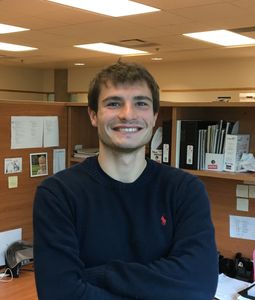Etienne Meunier
When Etienne Meunier arrived at Boston University Metropolitan College to study computer science, he couldn’t have imagined the strong connections he’d build with his peers and faculty there—let alone the research opportunities he’d encounter for his future career. From developing technology to detect the presence of sharks in the water to presenting at the Machine Learning in Computational Biology (MLCB) conference, his time in Boston inspired him to “continue into research, cultivate curiosity and get open to new fields of study.”

Etienne chose to get a second master’s in computer information systems through the BU MET International degree pathway program because of its quality of content and the University’s excellent reputation. But his experience exceeded his original expectations. By doing a concentration in data analytics, he was able to build upon his education at partner institution ECE Graduate School of Engineering in Paris. It also allowed him to focus on his career goal to use technology and computer science to help solve significant problems.
Much of Etienne’s professional success as a freelance IT consultant is owed to his willingness to reach out to others and build strong relationships. He credits MET professors Dr. Eric Braude and Dr. Eugene Pinsky for “enhancing [his] experience at Boston University greatly.” In fact, during his time researching shark detection technology for the Centre de Ressources et d’Appui (CRA), a research center at La Réunion, he worked with Dr. Pinsky to “organize a directed study on that subject.” Additionally, he credits Dr. Braude and his machine learning course for pushing him “ to evaluate the use of new techniques for this project and [helping him] to structure [his] ideas.”
Like many MET International students, Etienne is motivated by getting involved in research and “investing in challenging projects,” which he thinks is the key to mastering a domain of study. For example, he worked as an intern for the CRA in 2018 and then was later hired as a consultant to help create a shark-detecting algorithm. “My goal was to build a classifier using weekly labeled images (for each image the presence of a shark is known, but not its position),” he explains. “This is a tricky task, because the images are very large and the shark can be very small or far away. But if we managed to do that, it would reduce a lot of the manual labor needed to do the labeling.” In addition to machine learning, Etienne credits the IT strategy and management course at BU MET for informing the project launch and the organization of the labeling by operators.

Of course, Etienne’s MET International experience wasn’t just academic. He says he forged many strong bonds with his peers in the program, which he cultivates by phone and periodic visits to Boston. He also fondly remembers attending BU hockey games at Agganis Arena, recalling, “I was very impressed by the passion showed by the students for their team.”
Etienne now works in the field of genetic technology as a research assistant for Mostafavi Lab at the University of British Columbia. With plans to pursue a PhD in bioinformatics, he reflects, “I think that subject will tend to become significant over the next years, and it is intellectually fascinating to work on that kind of data.” He adds, “I am sure that will be a wonderful experience.”